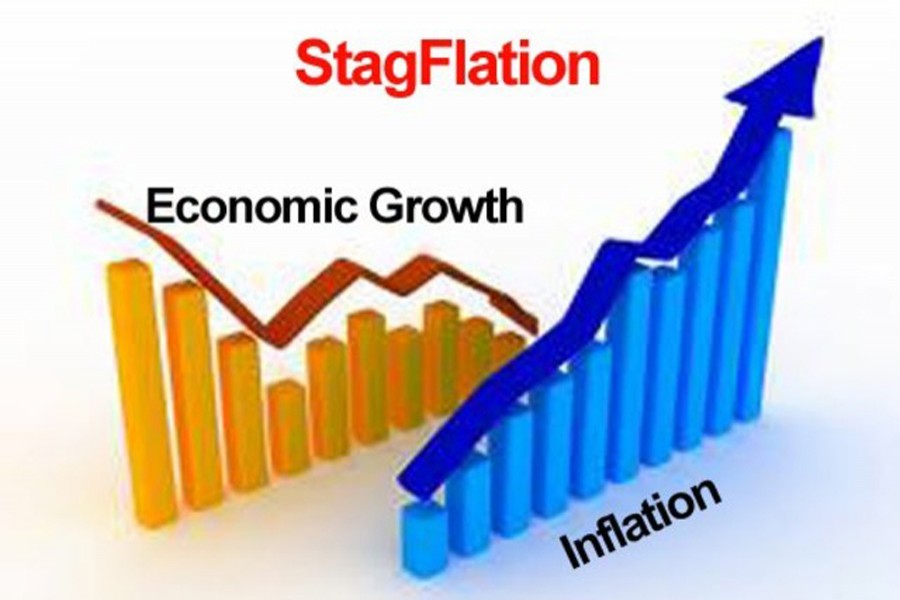Eminent economists suggest the government should use fiscal space to avert further price adjustments to help continue economic recovery from pandemic shocks, or else there could be risks of "stagflation".
Fresh price adjustments will push the country's economy into "the risk of stagflation amid rising inflation with decelerating growth", says Dr Zahid Hussain, former lead economist at the World Bank.
At a CPD press meet Sunday he said the planned new price adjustments would hit lower-and middle-income groups hard while they were recovering slowly from the pandemic wounds.
"My personal recommendation is that there is no need to raise the risk of economy by increasing prices during current fiscal year," says Dr Hussain.
He feels that it wouldn't be difficult to manage the additional burden from not increasing prices anymore in this budget by taking leverage from the fiscal space of first-half performance of this fiscal year.
However, he says if rise in prices of energy and commodities continued on the international market, the government shouldn't give subsidies in the next budget and increase prices.
The press conference was organised by the Centre for Policy Dialogue (CPD) on 'Changing Global Scenario and Bangladesh Economy: What Should Be the Policy Stance?' at its office in Dhaka.
Dr Zahid Hussain said the government should formulate a policy for adjusting prices taking energy prices as base for overall inflation.
He says energy price is politicised in the country.
"The government should depoliticise energy prices in the next fiscal year before further increasing energy prices," he says.
Distinguished Fellow of CPD Dr Mustafizur Rahman said the country's economy has become dependent with changes in the global economy as it is integrated to the global economy now.
He said balance of payments is now minus two-billion US dollars in the last seven months of the fiscal year.
He said export growth is now volume-driven but import-price drive is increasing the pressure on reserves to pay increasing price of import goods.
He said the negative growth of remittance will be increasing and it will be putting pressure on foreign-currency reserves.
The distinguished fellow said the government should take zero-tolerance watch on over-invoice, under-invoice and hundi to check downgrading trend of reserves.
Professor Selection Grade of Bangladesh Institute of Bank Management (BIBM) Shah Md. Ahsan Habib said crisis in the banking sector will begin and economy starts recovering as moratorium poses the crisis during the pandemic.
He feels that non-performing loans will not be reduced in the near future rather the volume may increase.
Mr Habib also observes the economy is over-dependent on the banking sector, which created expectation mismatch.
He suggests the government should focus on strengthening the capital base of the banks.
Prof M Tamim terms the proposed price raise irrational.
He says the crisis of energy price in the country is not actually related to war and international crisis. "Rather our energy price is related to mismanagement, lack of foresight."
MR Tamim thinks that prices of oil and gas will come down to a rational level soon but it is uncertain as nobody knows when war ends.
He recommends that a little price adjustment of oil, gas and power could absorb the current shock of inflation.
The keynote prepared by CPD on 'Changing Global Scenario and Bangladesh Economy: What Should Be the Policy Stance' says that the government should give attention to external trade, banking sector, and budget management besides rising inflation.
In the paper, the CPD observes that despite several provisions made in view of the pandemic, the banking sector is plagued by classified loans and capital shortfalls.
It says an independent banking commission should be formed on an immediate basis to mitigate the disarrays within the sector.
It also suggests that loan recovery should receive the highest attention along with the continuation of stimulus packages for SMEs.
And the stability of exchange rate must be ensured. "The value of BDT against major currencies should be stabilised in view of its inflationary implications," it says.
The paper notes that more fiscal space should be allocated for rising demands for subsidies and social safety-net programmes.
"The earlier measures to cut down 'unnecessary and luxury' public expenditure (e.g., government vehicle purchase) should be reinstated," it also says about the dos on the economic front in the present perspective.
The CPD also calls for curbing tax evasion by all means to generate resources for priority spending
CPD Executive Director Dr Fahmida Khatun presented another paper on rising inflation. She says while Bangladesh's economy was recovering from the effects of the Covid pandemic, the Russia-Ukraine war created global instability which is affecting Bangladesh as well.


